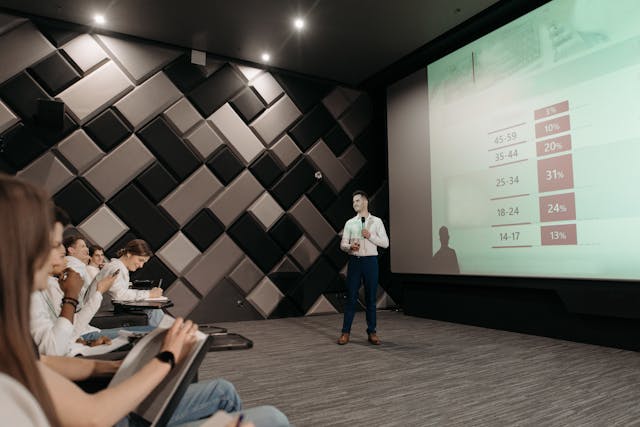Introduction
The ability to guide a group toward a shared goal, foster participation, and harness collective intelligence is one of the most valuable skills in today’s collaborative work environment. Whether leading meetings, training sessions, workshops, focus groups, or strategy sessions—effective facilitation is the key to better communication, stronger engagement, and improved outcomes. Facilitation Skills are no longer just a “nice to have”—they’re essential for anyone managing teams, leading change, or driving innovation.
This course is designed to empower professionals with the mindset, techniques, and confidence needed to facilitate both in-person and virtual interactions. Participants will explore how to create inclusive spaces, manage group dynamics, design agendas that drive action, and handle challenging situations with ease. From drawing out quieter voices to managing time and conflict, Facilitation Skills help turn passive attendees into active contributors—and transform conversations into results.
Whether you’re a team leader, trainer, consultant, or project manager, this course will help you facilitate with clarity, empathy, and impact.

Who Should Attend
This course is designed for anyone who leads groups and wants to improve their ability to engage others, manage discussions, and achieve results. It is particularly valuable for:
- Team Leaders, Project Managers, and Supervisors who lead meetings and workgroups
- HR Professionals, L&D Officers, and Internal Trainers who deliver sessions
- Consultants, Coaches, and Facilitators supporting group strategy or development
- Agile Practitioners, Scrum Masters, and Product Owners guiding team ceremonies
- Community Organizers and NGO Workers facilitating group initiatives
- Educators and Academic Professionals using collaborative instruction
Whether you’re running a 30-minute check-in or a two-day strategy retreat, this course will upgrade your Facilitation Skills to lead with purpose and presence.
Latest Trends in Facilitation Skills
Facilitation has evolved from basic meeting management to a critical leadership competency. In today’s diverse, remote, and fast-moving work environments, facilitation must be intentional, inclusive, and results-oriented. Below are six emerging trends in modern Facilitation Skills:
Virtual and Hybrid Facilitation Mastery
With the rise of remote and hybrid work, professionals must now facilitate across time zones, screens, and digital platforms. This requires a new toolkit of virtual engagement techniques, pacing strategies, and platform fluency.
This course teaches how to facilitate effectively using Zoom, MS Teams, and collaborative tools like Miro, MURAL, and Google Workspace. Facilitation Skills now include managing virtual breakout rooms, online energy, and remote collaboration challenges.
Inclusive and Equitable Participation
Modern facilitators must ensure that every voice is heard—especially those from underrepresented or quieter groups. Equity-focused facilitation creates space for diverse input and encourages psychological safety.
Participants will learn how to use inclusive language, culturally sensitive practices, and participation strategies that empower everyone. Facilitation Skills now directly support DEI goals and organizational belonging.
Outcomes-Focused Agenda Design
Facilitators are expected not just to “run the room” but to deliver results. Agile organizations require facilitation that drives decision-making, problem-solving, and ideation.
This course includes structured frameworks for designing outcome-based sessions such as decision matrices, action-planning canvases, and idea generation templates. Facilitation Skills help groups achieve clarity, consensus, and next steps.
Visual and Experiential Facilitation Techniques
Words aren’t always enough—especially in creative, technical, or emotionally charged sessions. Facilitators are now using visual tools and kinesthetic methods to spark dialogue and deepen understanding.
Participants will explore whiteboarding, visual facilitation, flipcharting, and physical movement techniques. Facilitation Skills now include designing experiences that engage multiple learning styles and thinking preferences.
Facilitation for Change and Innovation
Facilitation is increasingly used as a tool for leading change and driving innovation. From strategy off-sites to design sprints, skilled facilitators help teams reimagine problems and co-create solutions.
This course explores methods such as design thinking, appreciative inquiry, and systems thinking to guide transformational discussions. Facilitation Skills support innovation and adaptability across industries.
Emotional Intelligence and Group Dynamics
Skilled facilitators read the room, respond to emotion, and manage tension constructively. Emotional intelligence is essential for guiding conversations with empathy and authority.
Participants will build self-awareness, empathy, and relational skills to handle resistance, conflict, and complex interpersonal dynamics. Facilitation Skills are as much about emotional leadership as process expertise.
You may also be interested in other courses in the Human Resources Management
Learning Objectives
By the end of the Facilitation Skills course, participants will be able to:
- Define the role of a facilitator and distinguish it from trainer, manager, or speaker
- Design outcome-focused agendas and session flows for various group formats
- Use facilitation tools such as brainstorming, prioritization, and decision-making frameworks
- Apply inclusive practices to ensure equitable participation and psychological safety
- Manage time, energy, and attention to maintain group focus and engagement

- Navigate challenging situations including resistance, silence, or dominance
- Leverage technology for hybrid and virtual facilitation with confidence
- Use visuals and experiential methods to enhance understanding and collaboration
- Read group dynamics and apply emotional intelligence to manage behavior and tone
- Evaluate facilitation effectiveness and apply feedback for continuous improvement
- These learning outcomes ensure that participants leave with confidence, competence, and a toolkit for leading high-impact interactions across a range of settings.
Outcome for the Course Sponsor
Organizations that invest in Facilitation Skills build stronger collaboration, faster decision-making, and more inclusive workplace cultures. Sponsors benefit from:
- More productive meetings that result in actionable outcomes
- Reduced communication breakdowns and improved alignment among teams
- Increased employee engagement through inclusive participation and co-creation
- Faster resolution of issues through structured problem-solving techniques
- Better change management outcomes supported by skilled internal facilitators
- Enhanced leadership presence and communication across departments
- Stronger team dynamics and trust through psychological safety and group clarity
- A culture of dialogue, learning, and innovation supported by facilitative leadership
When more employees are empowered to lead discussions effectively, the entire organization becomes more agile, connected, and solution-oriented.









